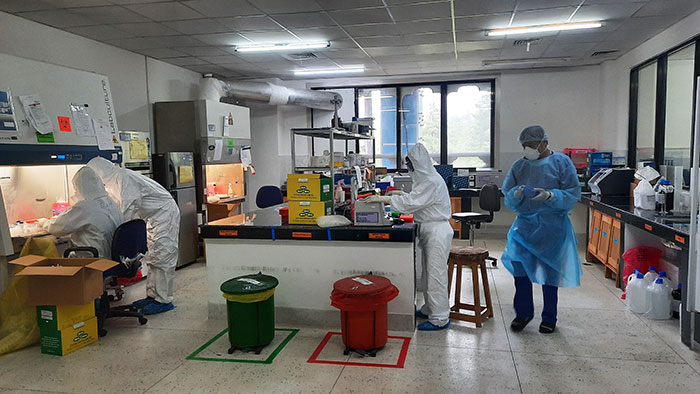The second patient tested negative on the retest earlier today
Younten Tshedup
Two Bhutanese referral patients tested positive for Covid-19 on reaching Kolkata, India last weekend. One of them tested negative in the second test the next day.
On October 16, 31 patients with 43 escorts left for different hospitals in Kolkata. On arrival, the patients were tested for Covid-19 as a requirement by respective hospitals before admission.
The liaison office in Kolkata reported to the health ministry that a patient had tested positive for Covid-19. A man who was referred following an eye problem tested positive on RT-PCR test.
Clinical microbiologist and member of the ministry’s technical advisory group (TAG), Dr Tshokey, said that it was not possible for the patients to test positive since they were referred only after being tested negative.
“We’re surprised when we heard the news. With all the protocols in place, we were confident that they were clean.”
He said that health workers in the health facilities including at the national referral hospital, where most of the patients had been, were routinely tested for Covid-19. Patients who required admission in the hospitals including their attendants are also tested.
“No health worker has tested positive so far, which is a pseudo indication of being clean,” Dr Tshokey said.
The patient who tested positive was admitted at the national referral hospital during the lockdown and had recently gone home. Dr Tshokey said that there was no risk of exposure associated with the man and he did not visit the high-risk areas recently. “He was sick so he couldn’t have gone out. His family members also attested to that.”
However, taking no risk, the ministry began testing all the contacts and family members of the patient here in the country. All 16 primary contacts tested negative.
The ministry requested the Kolkata hospital for a retest for the patient and his two escorts. All tested negative on the retest.
In the meantime, the Kolkata liaison office reported a second positive case from the same batch of patients. Some 20 primary contacts of the female patient were tested in Bhutan following the news. The results were negative.
The woman tested negative on the retest this morning.
Dr Tshokey said that the primary contacts were tested using both antibody and RT-PCR tests. “The antibody test was negative meaning there was no recent history of infection. And the RT-PCR test was also negative, meaning there was no current infection.”
Also, the national referral hospital had completed testing almost all its staff by yesterday. There were no positive cases. “This also gave us a reassurance that there could have been some errors.”
Why did it happen?
The RT-PCR test for Covid-19 is considered the gold standard test for diagnosis. “It is not very common to have false negatives or positives on the RT-PCR,” said the clinical microbiologist.
However, should it happen, a false negative result on the PCR test could happen during early or late infection with a low viral load. Sampling technique, improper sampling or problems during the sample processing could also result in a false-negative result.
The rare false-positive result of a PCR test could happen from cross-contamination of samples. Dr Tshokey said that during testing if by accident a negative sample comes in contact with a positive sample, cross-contamination could happen. Contamination of laboratory reagents could also lead to cross-contamination.
A cross-reaction could also lead to a false positive on the PCR. This, however, is more common with an antibody test than a PCR test, said the clinical microbiologist. “Very rare, but a cross-reaction with a virus having similar properties like that of a coronavirus could lead to cross-reaction.”
The probability of a false negative result on a PCR ranges between 2 to 30 percent. A UK based study found that a false positive result on a PCR ranges between 0.8 percent to 4 percent.
Dr Tshokey said, “We don’t really know what caused the results in our case. If the individuals were infected at the airport, it would be too early for them to test positive within 24 hours.”
Testing in Bhutan
In Bhutan, whenever there is a positive case, Dr Tshokey said that the test is repeated especially if there are no epidemiological or clinical risks associated with the person.
“Besides that, we test using a different testing protocol. We also repeat the tests with new samples. Once we’re convinced of the results, only then we release it.”
Of the many, there are Chinese, Korean, WHO and Indian testing protocols currently in use. Different protocols involve different reagents during the test.


